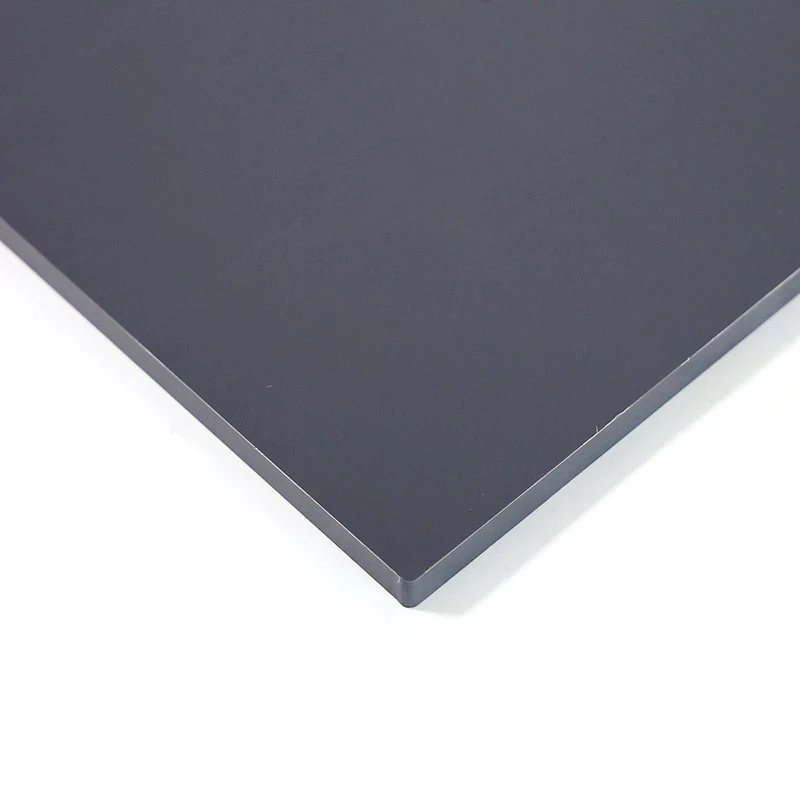Dec . 18, 2024 00:07 Back to list
Understanding CPVC Sheets for Your Construction Needs and Applications
Understanding CPVC Sheets Properties, Uses, and Benefits
CPVC, or Chlorinated Polyvinyl Chloride, has gained significant attention in various industries due to its remarkable properties and versatile applications. CPVC sheets are a popular choice in construction, plumbing, and manufacturing due to their unique characteristics that set them apart from conventional materials.
What is CPVC?
CPVC is a thermoplastic material derived from the polymerization of vinyl chloride, which undergoes a chlorination process. This modification enhances the material’s physical properties, including its heat resistance, chemical resistance, and mechanical strength. The result is a durable and flexible material capable of withstanding extreme conditions, making it suitable for a wide array of applications.
Properties of CPVC Sheets
1. High Temperature Resistance CPVC sheets are designed to endure high temperatures, often up to 200°F (93°C). This makes them ideal for piping systems that transport hot liquids, as they retain their integrity without deforming or degrading.
2. Chemical Resistance One of the standout features of CPVC sheets is their exceptional resistance to a variety of chemicals, including acids, bases, and salts. This property makes CPVC an excellent choice for chemical processing and laboratory applications, where exposure to harsh substances is common.
3. Corrosion Resistance Unlike metal alternatives, CPVC sheets do not corrode when exposed to moisture, making them a suitable choice for environments where water or chemical exposure is frequent.
4. Lightweight and Easy to Handle CPVC sheets are lightweight, which simplifies transportation and installation, reducing labor costs and time.
5. Durability and Longevity The durability of CPVC sheets allows for a longer lifespan compared to traditional materials, which may require frequent replacement and maintenance. This aspect not only saves money but also enhances the sustainability of projects using CPVC.
cpvc sheet

Uses of CPVC Sheets
CPVC sheets are employed in various industries, including
- Construction Used for roofing, wall cladding, and insulation, CPVC sheets provide excellent thermal and acoustic insulation properties.
- Plumbing CPVC piping systems are widely used for hot and cold water supply due to their high-temperature endurance and chemical resistance.
- Chemical Processing In laboratories and manufacturing facilities, CPVC sheets are used in fume hoods, tanks, and containment areas due to their ability to withstand harsh chemicals.
- Electrical Applications CPVC sheets also serve as electrical insulators, adding an additional layer of safety in various electrical applications.
Benefits of Using CPVC Sheets
The popularity of CPVC sheets can be attributed to several benefits they offer over alternative materials. Firstly, their remarkable strength-to-weight ratio makes installation easier and less labor-intensive. Secondly, their resistance to corrosion and chemicals ensures lower maintenance costs over time, as they are less likely to require repairs or replacements. Additionally, their energy efficiency can lead to reduced heating and cooling costs in building applications, further underscoring their economic viability.
Conclusion
In summary, CPVC sheets represent an innovative solution in various industries, combining durability, chemical resistance, and ease of use. As technology advances and the demand for efficient, reliable materials grows, CPVC will undoubtedly play a pivotal role in shaping the future of construction, plumbing, and other manufacturing processes. By understanding the properties and applications of CPVC sheets, businesses can make informed decisions that enhance their operational efficiency and product longevity, ultimately leading to significant cost savings and improved performance.
-
Durable Glossy PVC Rigid Sheet | Premium High-Shine Panels
NewsAug.26,2025
-
Durable PP Rigid Sheet: Lightweight, Chemical Resistant Solutions
NewsAug.21,2025
-
PVC Grey Sheet for Extraction: Chemical Resistant & Durable
NewsAug.19,2025
-
Durable PVC Pipe Fittings for Plumbing & Irrigation Needs
NewsAug.18,2025
-
HDPE Steel Belt Reinforced Spiral Corrugated Pipe | High Strength
NewsAug.17,2025
-
HDPE Pipe Fittings: Durable, Leak-Proof Solutions
NewsAug.16,2025

